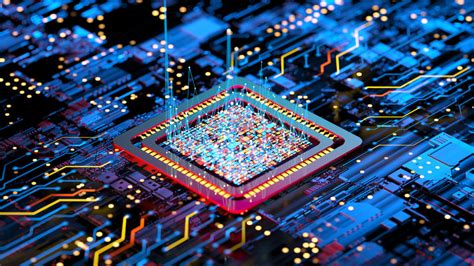The world of technology is on the cusp of a revolution, and at the heart of it all is the humble microchip. For decades, microchips have been the driving force behind the rapid advancement of technology, from the first personal computers to the smartphones that dominate our lives today. As we enter a new era of technological innovation, the role of microchips is set to become even more critical. In this article, we'll explore the chip tech revolution, its impact on various industries, and what the future holds for this exciting field.
What is Chip Technology?
Before we dive into the revolution, let's take a step back and understand what chip technology is all about. In simple terms, chip technology refers to the design, manufacture, and application of microchips, also known as integrated circuits (ICs). Microchips are tiny electronic devices that contain a large number of transistors, diodes, and other components, all fabricated onto a single piece of semiconductor material, typically silicon.

These chips are the brains behind modern electronics, from computers and smartphones to televisions and cars. They perform a wide range of functions, including processing information, storing data, and controlling devices.
The Chip Tech Revolution: What's Driving It?
The chip tech revolution is driven by several factors, including:
- Advances in Manufacturing: The development of new manufacturing technologies, such as 3D printing and extreme ultraviolet lithography (EUVL), has enabled the creation of smaller, more complex microchips.
- Increasing Demand for IoT Devices: The growth of the Internet of Things (IoT) has led to a surge in demand for microchips that can power these devices.
- Artificial Intelligence and Machine Learning: The increasing adoption of AI and ML has created a need for specialized microchips that can handle complex computations.
These factors have come together to create a perfect storm that's driving innovation in the chip tech industry.
Impact on Industries
The chip tech revolution is having a significant impact on various industries, including:
- Consumer Electronics: The development of smaller, more powerful microchips is enabling the creation of thinner, lighter, and more powerful devices, such as smartphones and laptops.
- Automotive: The increasing use of microchips in cars is enabling the development of autonomous vehicles and advanced driver-assistance systems (ADAS).
- Healthcare: Microchips are being used in medical devices, such as pacemakers and implantable cardioverter-defibrillators (ICDs), to improve patient outcomes.

Key Players in the Chip Tech Revolution
Several companies are playing a key role in the chip tech revolution, including:
- Intel: A leading manufacturer of microprocessors and other semiconductor products.
- Samsung: A major player in the memory chip market and a leading manufacturer of smartphones.
- Qualcomm: A leading developer of mobile chipsets and other semiconductor products.
These companies, along with others, are driving innovation in the chip tech industry and enabling the development of new technologies.
Future of Chip Technology
The future of chip technology looks bright, with several trends and technologies on the horizon, including:
- Quantum Computing: The development of quantum computers, which use quantum-mechanical phenomena to perform calculations.
- Neuromorphic Computing: The development of microchips that mimic the human brain and are capable of learning and adapting.
- 3D Stacked Processors: The development of microchips that use 3D stacking to increase processing power and reduce power consumption.

These technologies have the potential to revolutionize various industries and enable the development of new products and services.
Gallery of Chip Technology






Conclusion
The chip tech revolution is transforming various industries and enabling the development of new technologies. As we look to the future, it's clear that chip technology will play an increasingly important role in shaping our world. Whether it's the development of quantum computers or the creation of new medical devices, the possibilities are endless.
We hope this article has provided you with a comprehensive overview of the chip tech revolution. If you have any questions or comments, please feel free to share them with us.
What is chip technology?
+Chip technology refers to the design, manufacture, and application of microchips, also known as integrated circuits (ICs).
What is driving the chip tech revolution?
+The chip tech revolution is driven by advances in manufacturing, increasing demand for IoT devices, and the growing adoption of AI and ML.
What are the key applications of chip technology?
+Chip technology has a wide range of applications, including consumer electronics, automotive, healthcare, and more.
